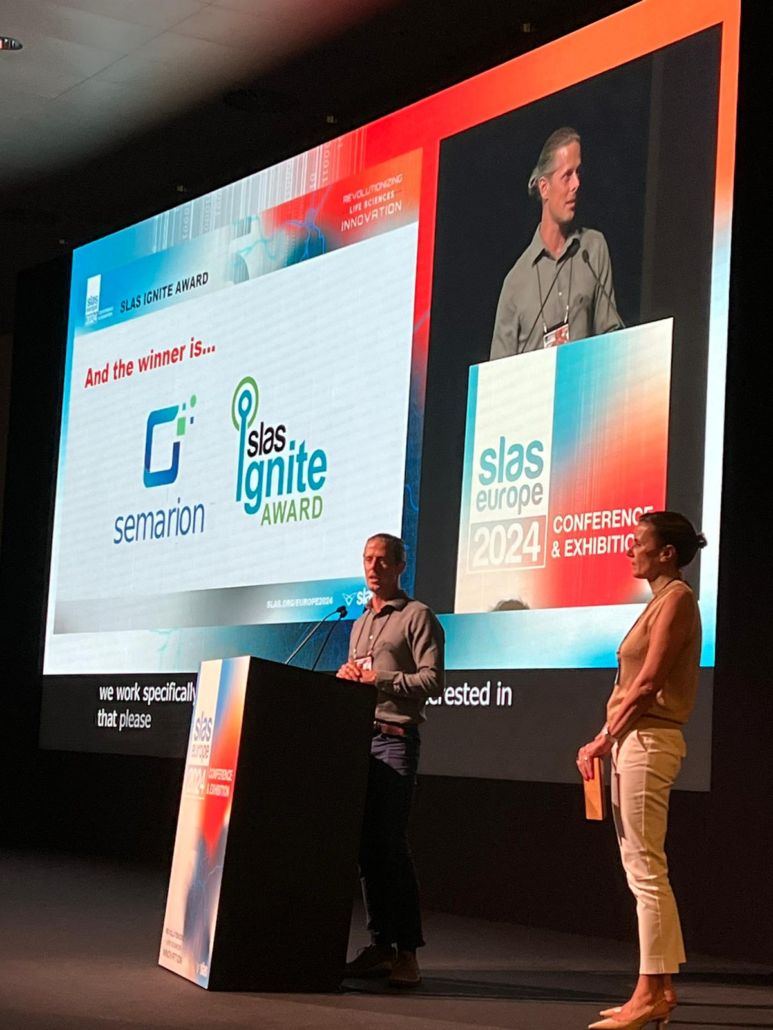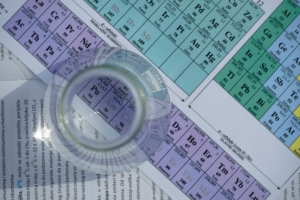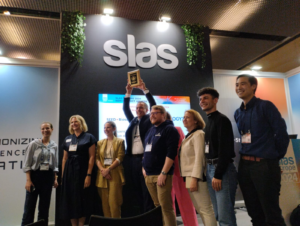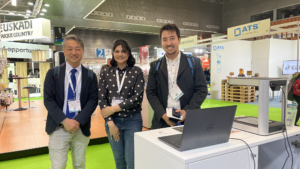
Semarion Ltd. wins Ignite SME award at SLAS Europe
UK-based Semarion Ltd. was honoured as the most innovative company in the field of laboratory automation at SLAS Europe 2024 in Barcelona.
Last night, the 19,000-member Society for Laboratory Automation and Screening (SLAS) has been presenting the Ignite Award for the most innovative laboratory automation start-up in Europe. The prize for the most innovative start-up was won by the British start-up Semarion Ltd.(Cambridge) at the international 5th SLAS Europe 2024 Meeting in Barcelona. Not without reason, as the rush to the British company‘s stand, that has already a bunch of partners like AstraZeneca, continued unabated after co-founders Jeroen Verheyen (CEO) and Tarun Vemulkar (CTO) presented their Cavendish Lab’s spin-off‘s technology in Barcelona. True to the motto of the SLAS Ignite Award, Semarion’s Semacyte platform promises real progress in drug development.
The Semacyte platform developed by Semarion enables adherent growing cells to be mobilised, magnetically aligned and tracked using microcarriers without losing the morphology and function of the cells, so that they can be handled and optically analysed using standard liquid handling tools used in drug development. According to Verheyen at the presentation of the finalists in Barcelona, this enables a sigificantly faster data generation than with high-throughput screening tools. At the same time, around 100 times fewer cells (SemaCyte) are required for screenings and these can be stored frozen.
“Our SemaCyte® cell assay microcarriers function as ultra-miniaturised, mobile, barcoded wells that carry small colonies of adherent cells. They can be moved with liquid handling tools, are magnetically steerable and can be frozen as assay-ready cells,” the founders summarise on the company‘s website. According to Semarion, the barcodes are viewed using bright-field microscopy and digitally deconvoluted using Semalyse software. Multiplexing and combining different barcoded adherent cell types in one well enables pooled cell screening, which accelerates discovery campaigns and reduces the resource burden of cell testing. The young company offers an early adopter programme in which interested companies can test their product.
After receiving the award Jeroen stated: “Receiving the SLAS Ignite Award is a tremendous honour. At Semarion, we are revolutionising in vitro drug discovery with our proprietary SemaCyte® platform, which leverages novel materials physics to mobilise and barcode adherent cells. Our technology addresses fundamental bottlenecks in rapid data generation, offering a 10x increase in throughput and a 6x cost reduction to drug discovery workflows. The SLAS Ignite Award highlights the promise of our technology in transforming cell biology automation, and it is an invaluable endorsement as we move forward. We have recently launched the early adopter programme for our SemaCyte microcarrier platform and are already working on exciting projects with pharma companies and CROs. As we prepare for a full commercial rollout in the UK, EU, and aim to enter the US market, this award boosts our visibility and credibility among potential customers and investors. We are eager to continue our mission to accelerate drug discovery and deliver groundbreaking solutions to the biopharma industry.”
Together with Semarion, four companies with highly interesting platforms had qualified for the final of the Ignite Awards and presented their technologies at SLAS Europe:
Paris-based Oria Bioscience SA, led by CEO Alexandre Santinho, presented a microfluidic platform for the screening of whole organelles, which allows the testing of targets such as the lyso-resident protein for the treatment of lysosomal storage diseases in their native environment with a throughput of up to 50,000 compounds per week. The company, which has been financed with €800,000 to date, is building up its own pipeline in addition to the licensing business.
The Swedish company Lucero Bio A/S, which was founded in March 2020 through a matching programme of Chalmers E-School/Chalmers Ventures and is led by CEO Christopher Jacklin, presented a chip-based automated platform for cultivating, sorting and screening 3D spheroids/organoids. This promises to make the largely manual work involved in using human organoid models for lead optimisation and metabolic profiling more reproducible, cost-effective and manageable.
The Spanish company Loop Diagnostics SL addresses the medically unaddressed but important issue of early sepsis diagnosis. CEO Enrique Hernandez wants to make this 10 times faster and 3x more effective than previous culture-based methods that work with serum biomarkers or are based on pathogen detection (usually PCR-based). To do this, the company is using a new type of immune systems response assay called Septiloop with 90% sensitivity. Briefly summarised: Blood is incubated and then immune response is measured. The prognostic test could reduce sepsis morality by10-25% and is to be commercialised in the UK from 2025, then in the EU.
The German spin-off from the University of Ulm, Sensific GmbH, combines microfluidics with image-based analysis, cell sorting and microscopy to enable assay-driven cell sorting. According to CEO Daniel Geiger, the flagship product ODIN adds high-speed and high-throughput real-time image processing capabilities to microscopes or customised setups. You can analyse your experiment label-free in brightfield or simultaneously with up to 3 additional fluorescence imaging channels. ODIN automatically measures particles, cells, droplets, algae, bacteria and droplets in microfluidic systems. Its intelligent algorithms provide more than 30 parameters of the object, including size, circumference, aspect ratio or brightness, and display them in a user-friendly interface.
With the very well-attended SLAS Europe, SLAS is building on its successes in its founding country, the USA, which is now to be exported to Europe and is intended to generate more innovations in Europe through stronger networking of the players, cooperation between innovators and large companies, training of talents, integration of new technology options, for example AI. One means of achieving this is a linked-in offered by the society for the life sciences automation sector. Another is the diverse conference programme with the two major annual conferences in the USA and Europe. It is no coincidence that SLAS Europe 2025 is being held in Hamburg.SLAS is working to attract more bioscientists and biotechnologists from Germany to the European community and the SLAS European conference.



 SLAS
SLAS Acoustofab Ltd
Acoustofab Ltd